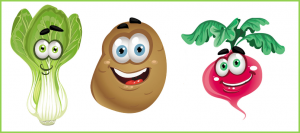
#1. Dark Green, Leafy Vegetables
The best of all of the dark green and leafy vegetables is Kale. It’s a powerhouse for nutrition. It has lots of fiber and copper a difficult nutrient to keep in a lesser diet and kale also contains iron, vitamin A, C, K, manganese, as well as
myriad phytonutrients.
Feel free to treat it as you might do to spinach. Steam it! Otherwise, sautee some kale, or cut the rib out, chop up the green, and toss it in your salad. If you want it as a snack, consider finding a recipe for baked kale chips. They have lower calories, lots of nutrients, and they’re customizable, so they’re better for you than potato chips or tortilla chips.
Iceberg lettuce on your burger is ok, but not as good as the darker green veggies. The fiber and the nutrient content in darker green vegetables give you more nutrition. You’ll improve your blood flow and raise your vascular function with the folate found in dark green veggies, and you’ll improve your eyes’ adjustment to bright lights, while filtering out any harmful blue rays, from the antioxidant known as lutein.
You can also try arugula, romaine lettuce, and spinach. These are all good in salads, wraps, on sandwiches, burgers, or even pizza.
#2. Yam
You may find yams that vary in colour, both inside and out. But they all have vitamin B6, C, fiber, manganese, potassium, and more, and lots of it. Potassium will keep your blood pressure normal and help you avoid muscle cramps. They also have some complex carbs in them, which will help your stamina.
You should note, yams and sweet potatoes are two different things. However, if you opt for sweet potatoes, you’ll still do well. These potatoes also have complex carbs, vitamin A and B5, and several other kinds of nutrients you’d find in yams.
#3. Beets
Beetroot juice is the juice of athletes, and you will find beet extracts in some of your pre-exercise supplements. It’s not a fad. Research has been done and it supports the claimed potential benefits you’ll receive from adding beets to your diet.
Beets are rich with nitrate, which becomes nitrite when you digest it, generating nitric oxide. Nitric oxide is a little bit of gas that will expand your blood vessels, which will improve your oxygen and your nutrient delivery system within. Don’t follow up beets with mouthwash, and make sure you’re not on antibiotics. Since these kill bacteria, you’re going to kill off the good bacteria that is necessary to convert nitrate to nitrite, essentially losing out on major benefits.
Alright, so maybe you don’t want to courageously try beetroot juice. That’s okay! But be sure to add beets to your diet in order to have a regular amount of nitrates in your system. If you haven’t had them, they’re sweet. You’ll also find folate as well as betaine within beets, which reduce inflammation. You can add beets into your salad or you can roast them. Roasting will enhance the sweet flavor and give it a tender texture.
Completely ignore canned beets and if you can, avoid trimmed beets. You want the ones with the greens on them. You can actually add the beet greens to a sauté or bring them to a boil. If they wilt, bring them back up to par by leaving them in cold water for 30 minutes.
Remember, you don’t need to eat just these vegetables. Beet burgers are not unheard of. Topped with kale, you’d have a very healthy and beneficial beet burger in your hands. And perhaps some baked yam fries as a side dish. Or add these veggies separately to different meals, like steak and eggs with a kale salad. Experiment!
Sign Up For Your FREE Trial Today
RECOMMENDED POSTS: